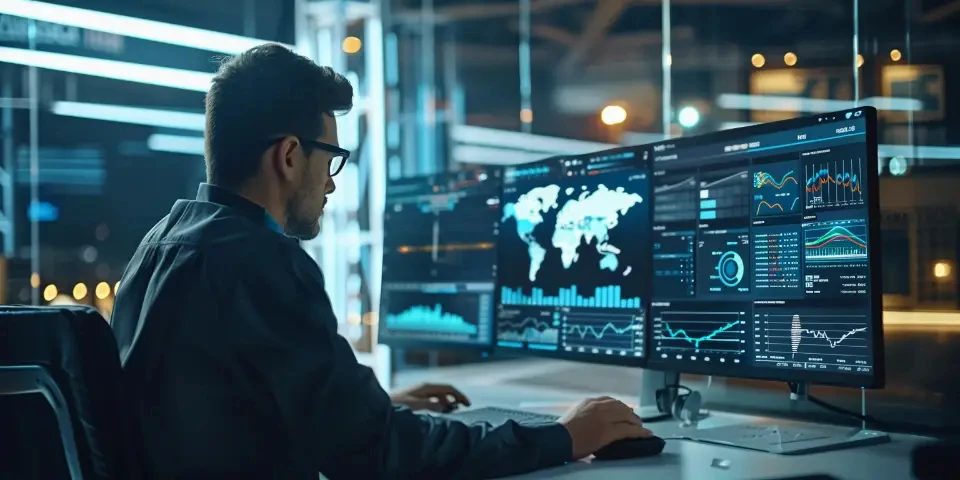Unlocking the Potential of Smart Cities AI's Impact on Urban Development
Smart cities, powered by artificial intelligence (AI), are revolutionizing urban development by utilizing data, connectivity, and automation to enhance the quality of life for citizens. As technology continues to advance, AI is becoming increasingly integrated into various aspects of urban planning and management. In this article, we will explore the transformative impact of AI on smart cities, examining its implications for transportation, energy, healthcare, public safety, sustainability, citizen engagement, and economic growth.
1. Transportation
AI-powered systems are reshaping transportation in smart cities. Traffic management systems employ machine learning algorithms to optimize traffic flow, reduce congestion, and minimize carbon emissions. Autonomous vehicles, guided by AI algorithms, promise a future of efficient and safe transportation, reducing accidents and enhancing mobility for all.

Furthermore, AI-driven ride-sharing platforms, such as Uber and Lyft, leverage data analytics to match passengers and drivers, optimizing routes and reducing the number of empty vehicles on the roads. This contributes to reduced traffic congestion and environmental impact while improving urban mobility.
2. Energy
AI technologies are vital for energy optimization in smart cities. Machine learning algorithms analyze vast amounts of data to predict energy demand patterns, optimize energy distribution, and reduce energy waste. Smart grids enable real-time monitoring and management of energy consumption, allowing for efficient allocation and utilization of resources.
Moreover, AI-powered energy management systems can enhance renewable energy integration by optimizing the balance between supply and demand, enabling cities to become more sustainable and reduce reliance on fossil fuels.
3. Healthcare
AI is revolutionizing healthcare delivery in smart cities. Machine learning algorithms can analyze medical data to identify patterns and predict disease outbreaks, enabling proactive interventions to prevent the spread of diseases. AI-powered chatbots and virtual assistants provide personalized health advice, improving convenience and access to healthcare services.
In addition, AI-powered medical imaging systems enhance diagnostic accuracy, aiding healthcare professionals in detecting diseases earlier and improving treatment outcomes. Telemedicine, relying on AI algorithms, enables remote consultations, monitoring, and diagnosis, extending healthcare services to underserved areas.
4. Public Safety
AI plays a crucial role in enhancing public safety and security in smart cities. Intelligent video surveillance systems, equipped with facial recognition and behavior analysis capabilities, help identify and prevent criminal activities. These systems can detect abnormal behavior and alert authorities in real-time, enabling swift responses.
AI algorithms can also analyze social media and other digital platforms to detect potential threats and enable proactive measures. In emergencies, AI-based emergency response systems aid in efficient resource allocation and coordination, ultimately saving lives.
5. Sustainability
AI contributes significantly to sustainable urban development. Smart waste management systems use AI algorithms to optimize waste collection routes, reducing unnecessary vehicle emissions and improving overall efficiency. AI-powered environmental monitoring systems enable real-time tracking of pollution levels, facilitating targeted interventions to improve air and water quality.
Furthermore, AI-driven predictive modeling helps in urban planning by considering factors like population growth, land use, and climate change impacts. This enables cities to develop sustainable infrastructure, reduce resource consumption, and mitigate environmental risks.
6. Citizen Engagement
AI technologies foster citizen engagement and participatory governance in smart cities. Virtual assistants and chatbots enable instant interaction between citizens and local government authorities, enhancing accessibility and responsiveness. AI-driven sentiment analysis tools help gauge public opinion and sentiment, enabling policymakers to make informed decisions.
Apart from that, AI-powered platforms facilitate community-driven initiatives and crowd-sourced problem-solving, encouraging active citizen participation in decision-making processes. This empowers citizens and promotes a sense of ownership and social cohesion within the community.
7. Economic Growth
AI has a transformative impact on economic growth in smart cities. Advanced analytics and predictive modeling enable more accurate demand forecasting, optimizing business operations and reducing operational costs. AI-driven recommendation systems personalize customer experiences, fostering customer loyalty and driving economic activity.
Moreover, AI algorithms improve supply chain management by optimizing inventory levels, reducing wastage, and lowering transportation costs. This streamlines business processes, increases efficiency, and fuels economic growth and competitiveness.
8. Education
AI-based educational tools are transforming how knowledge is imparted in smart cities. Intelligent tutoring systems employ machine learning algorithms to personalize learning experiences, adapt instructional materials based on individual progress, and provide immediate feedback to students. This enhances the effectiveness and efficiency of learning processes.
Additionally, AI-powered language learning applications, such as Duolingo, leverage natural language processing algorithms to enable personalized language learning experiences, catering to individual learning styles and proficiency levels. This promotes inclusivity and access to quality education for all.
Frequently Asked Questions:
Q: What are the potential challenges of implementing AI in smart cities?
A: Some challenges include data privacy concerns, ethical considerations, and ensuring equal access to AI-enabled services for all citizens.
Q: Can AI completely replace human involvement in urban development?
A: No, AI is a tool that enhances decision-making processes and efficiency. Human involvement and oversight are still essential for ethical and responsible urban development.
Q: How can smart cities ensure the security of AI-powered systems?
A: Smart cities need robust cybersecurity measures, including encryption, authentication protocols, and continuous monitoring, to safeguard AI systems from potential cyber threats.
References:
1. Smith, J. (2018). The Impact of AI on Smart Cities.
2. Johnson, A. (2020). Smart Cities and Artificial Intelligence: Enhancing Urban Life.
3. Li, X., & Zhang, Z. (2019). Application of Artificial Intelligence in the Construction of Smart Cities.
At Wemate AI, share your passion for peculiar tea flavors! Ready for a hot discussion about broccoli berry tea? Prepare your taste buds for adventure!
Explore your companion in WeMate